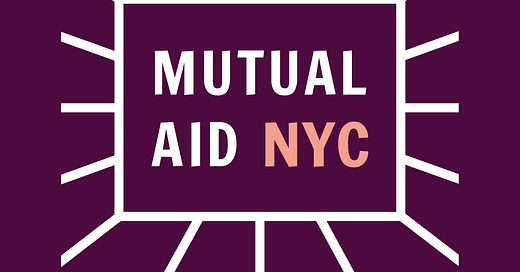The History of Mutual Aid + Ways to Keep Showing Up
MANYC Community,
This week, we are looking at the history of mutual aid to understand how we got to where we are today, as well as how to exist and thrive together in and beyond COVID-19. For many, this is the first time engaging in “mutual aid” efforts, but oppressed communities have relied on mutual aid for decades.
Mutual aid continues to be an essential part of the fight for Black liberation.
Regan de Loggans, queer indigenous community organizer and agitator with the Indigenous Kinship Collective, writes,“Mutual Aid is a unifying term, putting a name to the practice that most of us (BIPOC) folx have been acting on all our lives.”
Here’s how Regan de Loggans breaks it down in their mutual aid zine, which you can access here:
Mutual aid is simple...
Mutual aid is anti-capitalist. It breaks “the binary of the ‘haves and have nots’ with the intention to re-allocate for equitable access to resources, education, and needs.” It puts control back in the hands of community members and “demands reciprocity and resource exchange.”
Mutual aid is a non-Western tradition. It is “Indigenous lifeways and sovereignty; it is Black thrivance and power.” It is a practice that most people of color have been following for a long time, and predates colonialism and capitalism. People of color were (and still are) criminalized and strategically targeted for practicing mutual aid; in our current use of the practice, we must not erase that history. The co-option of mutual aid without accountability amounts to racism.
Mutual aid is about making a LONG-TERM commitment to the community. The reallocation of resources is important, de Loggans writes, but it “cannot be temporary. It must be carried into the world beyond times of panic, emergency, or pandemic.”
Mutual aid is about solidarity, not charity. It is based on the premise that everyone in society has something to contribute, and should have equal agency regardless of their abilities or financial assets. “We ask for folx to skill-share as part of the practice,” de Loggans writes. “But we do not demand of them to contribute if they cannot in the moment, or force any ideologies of ‘owing’ someone or something. This is how we break ageist, ableist, labor hierarchy. No matter the age, no matter the ability, no matter the education, people can contribute.”
We at Mutual Aid NYC understand that aid must come with accountability. We are grateful to organizers like de Loggans who continue to pave the way. And, as a group based in NYC, we recognize that the city is built on stolen Lenape land.
More on the history of Mutual Aid:
Read
Regan de Loggans’ mutual aid zine.
A blog post about how New York’s immigrant communities have long relied on Mutual Aid.
This article about the New York African Society for Mutual Relief (1808-1860)
About the history of Black mutual aid, Latinx mutual aid, and Chinese American mutual aid in the Radical Past and Present of Mutual Aid.
Listen
To an interview with organizer Mariame Kaba in which she calls for a “People’s Bailout to Confront Coronavirus.”
**If you find this zine useful and/or intend to share this information widely, we encourage you to donate to Regan and the Indigenous Kinship Collective for their labor via Venmo.**
Keep following Black-led Calls to Action.
Just this week, New York State lawmakers voted to repeal 50-A, the privacy law that kept police disciplinary records sealed from the public for 44 years. This is a huge step forward in protecting Black communities from police brutality, and would not have happened without protests and activism of all kinds. It's not the only win: Mayor de Blasio has committed to channeling money from the NYPD budget to youth and social services, and chokeholds have been criminalized. None of this is enough, but it shows that we have the attention of lawmakers and we must keep showing up.
If you want to participate in street actions:
Learn before you go. Show up prepared.
Follow @justiceforgeorgenyc on Instagram for tips on where to go.
If someone you know gets arrested and you need help locating them, contact Good Call NYC and Creature Friend Finder.
Astoria Mutual Aid Network has put together a printable leaflet for protesters to know their rights and practice safe protesting.
Safe action protocols when participating in protests
Surveillance Self-Defense for Attending a Protest from the Electronic Frontier Foundation
Nourish NYC - Black-led initiative providing protest equipment (PPE, Water, Food, Cash Assistance)
Defund the NYPD
Urge politicians to defund the NYPD. The NYPD budget has grown for 20 years, regardless of broader budget fluctuations. Our communities need more significant cuts than the 5% that the Comptroller and City Councilperson have suggested. This is funding badly needed by education, housing, and social services.
Call or email the Director of the Office of Management and Budget for the Mayor, the City Comptroller and your local City Councilperson and ask them to #DefundNYPD by at least $1 billion this year!
Go to defundnypd.com for more ways to take action.
Talk to non-Black people you love about structural racism.
Some helpful compilations of resources:
This Is Not A Riot! A Reading List for Talking to Moderate Friends & Loved Ones (MANYC)
Donate to NYC based bail and mutual aid funds.
FTP: Donate to their bail fund here: @FTP4BAILFUND.
In solidarity,
Mutual Aid NYC (MANYC)

We're also looking for information on how we can support you. If you have feedback about the newsletter, please email us at manycnewsletter@gmail.com.
You can also follow Mutual Aid NYC on Instagram, Twitter, and Facebook. We encourage you to DM our accounts to have your content re-posted.



